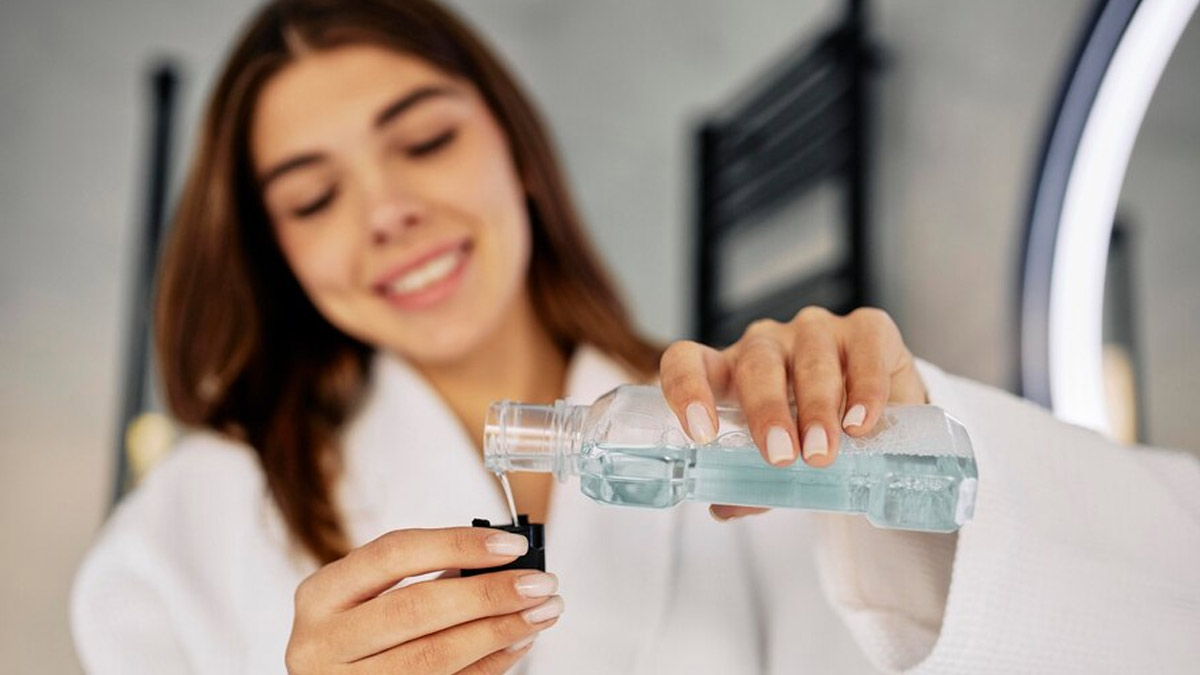
Mouthwash freshens the breath, prevents cavities, and also helps reduce plaque buildup, fight tooth decay, and lower the risk of gingivitis. While it does not match up to the benefits provided by regular brushing and flossing, it is believed to help maintain overall oral and dental health.
Table of Content:-
However, to understand the extent of its effectiveness, we spoke to Dr Srilaxmi, Senior Lecturer, Department of Periodontology, MCODS, Manipal, who sheds light on its use, benefits, and side effects.
Also Read: Poor Oral Hygiene Alone Does Not Cause Gum Disease: Other Causes To Consider
Are Mouthwashes Really Effective?

Dr Srilaxmi describes mouthwash as a medicated liquid used as a preventative measure to keep the oral cavity clean.
According to her, the most popular mouthwash varieties contain agents like metal salts, essential oils, phenols, fluorides, bisbiguanides, and oxygenating agents, among others, which lessen the likelihood of tooth decay and reduce plaque, irritation, painful gums, bad breath, and bleeding gums.
The American Dental Association (ADA) suggests there are two main types of mouthrinse: cosmetic and therapeutic.
Therapeutic mouthrinses can be found both Over-the-Counter (OTC) and by prescription, depending on the formulation, whereas cosmetic mouthrinses work temporarily, reducing bad breath and providing a pleasant taste, but have no effect on oral bacteria.
Dr Srilaxmi says, “The effectiveness of mouthwashes varies depending on the type and purpose of use. For example, fluoridated mouthwashes strengthen enamel and lower the risk of cavities; antibacterial mouthwashes reduce bacterial load and inflammation; cosmetic mouthwashes reduce bad breath; and alcohol-free mouthwashes can be used on patients with sensitive gums.”
Does Excessive Mouthwash Use Have Any Side Effects?

Ideally, most dentists recommend using mouthwash twice a day for a certain amount of time. “It should be swished in the mouth for one or two minutes before being spit out, and it is advised not to eat or drink for thirty minutes,” says Dr Srilaxmi.
However, prolonged or excessive usage might result in stains, the destruction of beneficial bacteria, dry mouth, irritation, hypersensitivity, changed taste perception, burning, and other side effects, she warns, adding that there are a lot of goods on the market that are sold commercially.
Who Should Avoid Using Mouthwashes?
The ADA advises against the use of mouthwashes for children younger than six, unless directed by a dentist, because they may swallow large amounts of the liquid inadvertently.
In addition, people who should avoid using mouthwashes include:
- Women who are nursing or pregnant
- People with dry mouths as the alcohol in mouthwash exacerbates the symptoms of dry mouth.
- Allergy sufferers, as certain mouthwash components might cause an allergic response.
According to Dr Srilaxmi, mouthwashes are used as an adjunct and work best when used in conjunction with consistent brushing and flossing. It's advised to see a dentist before beginning any new oral hygiene regimen.
Also Read: How Good Is Your Oral Health? Expert Lists Signs To Watch Out For And Remedies
Natural Alternatives

Here are some natural alternatives to mouthwashes that can provide benefits for your oral health:
- Use a saltwater rinse to relieve irritated gums since it naturally has antimicrobial qualities.
- Dilute hydrogen peroxide with equal parts water and use it as a rinse; use it sparingly, though, and keep it out of your mouth.
- Green tea because it naturally contains antioxidants that can lower inflammation and bacteria.
- Oil pulling
- Baking soda solutions aid in destroying germs and neutralising acidity.
Conclusion
For many people, using mouthwash is a key part of their dental routine. It helps prevent bad breath and, depending on the type of mouthwash, can also reduce the risk of tooth decay, gum disease, and more. However, it is crucial to remember that mouthwash does not replace regular brushing and flossing; it should be used in conjunction with these essential practices for optimal oral health.
Also watch this video
Read Next
Chinese Influencer Dies From Overeating During Livestream; Ways That Overeating Affects Your Body
How we keep this article up to date:
We work with experts and keep a close eye on the latest in health and wellness. Whenever there is a new research or helpful information, we update our articles with accurate and useful advice.
Current Version